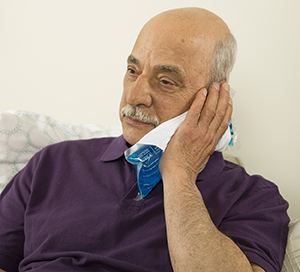Dental Trauma
One or more of your teeth have been damaged. If the surface of the tooth is chipped, your dentist should be able to smooth or repair it with a filling or cap. Make an appointment when you can.
If the tooth is broken off and sensitive to hot or cold, it’s important to see a dentist or oral surgeon as soon as possible for evaluation and treatment.
If the tooth is pushed out of place, the tooth socket (bone) has a break in it. You must be seen as soon as possible by your dentist or oral surgeon. They may be able to put the tooth back in alignment and splint it, if this was not already done by your healthcare provider. This will hold the tooth in place.
If the tooth is knocked out, your dentist may be able to put it back into the socket, if this was not already done by your healthcare provider. It may be loose and could fall out again. See your dentist or oral surgeon as soon as possible. They will put a splint or brace on the tooth to hold it in place. The tooth may reattach and stay in place for months or years. But it may not be the same as a normal tooth. It may discolor or need a root canal to preserve it.
Not all teeth that have been knocked out can be put back in place. If that’s the case, put pressure on the socket with a clean, folded gauze pad or cotton swab to prevent bleeding. See your dentist or oral surgeon as soon as possible for further evaluation.
Home care
Follow these tips when caring for yourself at home:
-
Unless a splint was applied to your tooth, bite on a clean, folded gauze pad or cotton swab to apply pressure to the tooth. This will help keep it in place until your dentist or oral surgeon sees you.
-
Don't have very hot or very cold foods and drinks. Your tooth may be sensitive to temperature changes.
-
Don’t chew on the side of the injured tooth.
-
Put a cold pack on your jaw over the sore area to help ease pain. To make your own cold pack, put ice cubes in a bag that seals at the top. Wrap the bag in a thin towel. Don’t put the ice directly on your skin. Doing so can damage the skin.
-
You may use over-the-counter medicine to ease pain unless another medicine was prescribed. If you have chronic liver or kidney disease, talk with your provider before using acetaminophen or ibuprofen. Also talk with your provider if you’ve had a stomach ulcer or digestive bleeding.

Follow-up care
Follow up with your dentist or an oral surgeon as advised.
Call 911
Call 911 right away if any of these occur:
When to get medical advice
Call your healthcare provider if any of these occur: